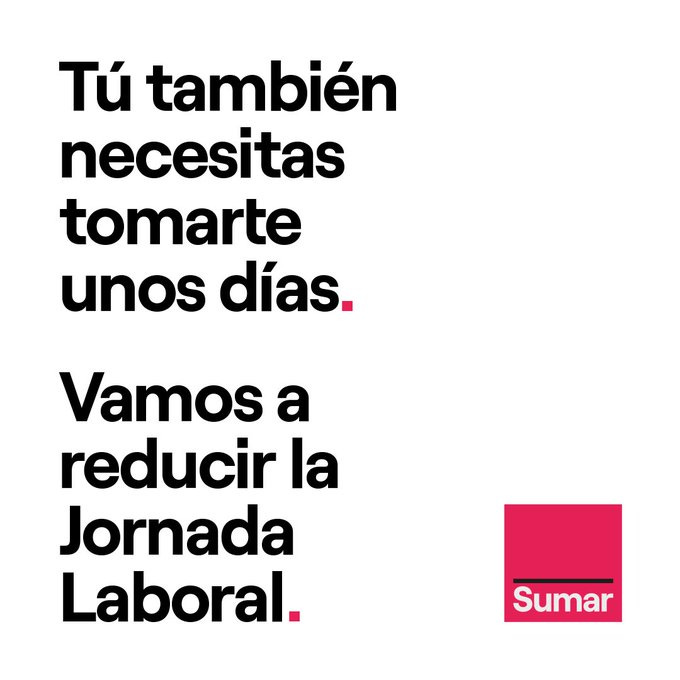The Opposite of Work
The original (Spanish) version of this article can be found here.
Last May marked five years since we implemented the four-day workweek at La Francachela. It’s been amazing to watch how quickly an idea that once seemed outrageous has found its place—not just in public opinion, but also on the government’s agenda for the years to come.
But I have to admit that I sometimes feel uneasy about how this initiative is being translated into politics. It seems like an idea that benefits not only workers but also companies is suddenly being framed as a band-aid for the failings of the labor market: we need to work less because we’re tired, because we’re overworked, because we just can’t take it anymore.
The latest version of this narrative appeared in a poster shared by Sumar, making a joke about the reflection days Pedro Sánchez took.
It says: "You need to take a few days off too. Let's shorten the workweek."
According to this perspective, the reason we should work less is so we can rest. As if work and rest were two sides of the same coin. Work is capitalism and rest is life, and the two are in constant opposition. We should work less to live better. But that’s like saying we should sing less so we can breathe better. They’re not opposites. Resting, like breathing, is an essential part of life—not the B-side of work.
Because the opposite of work isn’t rest—it’s play.
This becomes clear when we define each of these things properly. Work is everything we do with an extrinsic motivation: for money or out of obligation. Play is everything we do for its own sake: to explore, learn, create, or love. Rest, then, is a parallel activity to both—not the opposite of either.
And yet, when we talk about the four-day week, we rarely go beyond the surface to imagine all the possibilities that could arise if we worked less: that we might study more, or travel more, or start more businesses, or become artists, or teachers, or have more children—or more friends.
Sometimes I feel like imagining a better world is seen as a betrayal of how serious everything is. As if we’re supposed to stay angry, and imagining has become taboo.
Whatever the case, we seem incapable of even imagining any life activity that isn’t work. This mindset seeps into other areas of politics and can even be seen in urban proposals from progressive organizations. The so-called 15-Minute City, which has many merits, is still an idealization steeped in rest—but with no trace of other imagined activities.
And that’s why Sumar’s poster falls so short. Rest, as presented here, is actually part of the same system as work: you rest so you can get back to producing. Reducing working hours becomes a palliative measure because “we need a few days” before returning to the grind. It doesn’t explore any other horizon.
But it doesn’t have to be that way. There could be a society where people’s main pursuit is play. Now more than ever, when technology can take care of most of the things we used to do out of necessity a hundred years ago. Nothing stands in our way—except our own mental barriers—from a world where people gain recognition and social value not for how much they work, but for how well they play.
A society that’s… childlike! But in the best possible sense. Where, like in the schoolyard, the most successful people are those who invent the best games—those who are the most fun, the most inspiring, the ones who bring everyone together to play.
This already happens, in some circles. If some people have managed to partially escape the system, it’s by having something we still call “jobs,” but that are actually forms of play: artisans who create, university professors who explore scientific fields, hackers, journalists, and many creative professionals. Entrepreneurs who start businesses or launch projects are also operating in the realm of play.
The challenge is to make this way of living more widespread—not limited to a privileged few, but accessible to everyone. That’s what the four-day workweek is for—not to rest, but to play.




